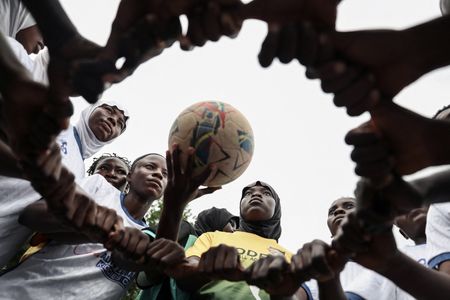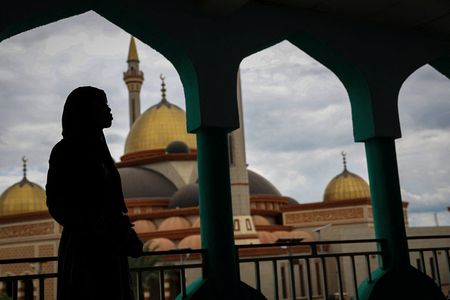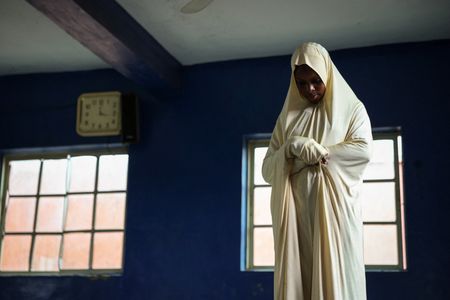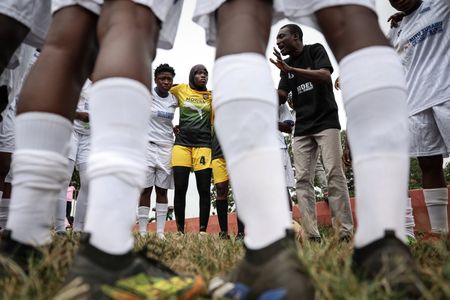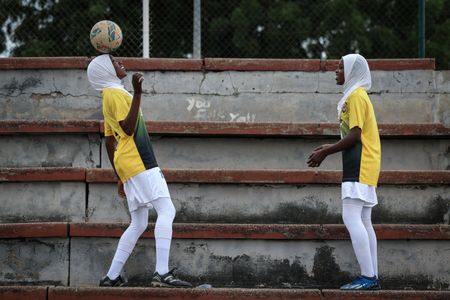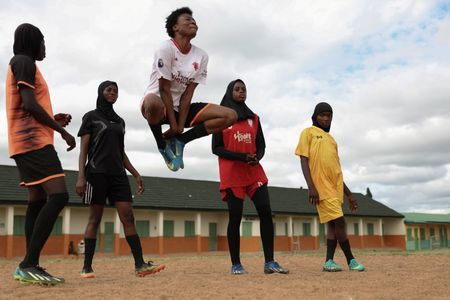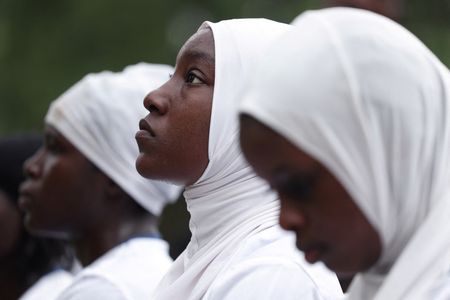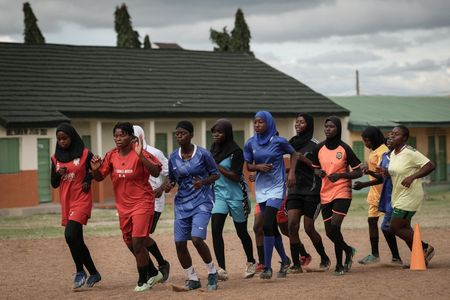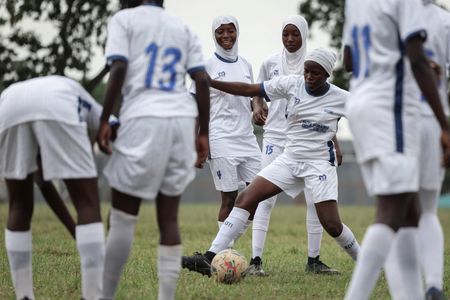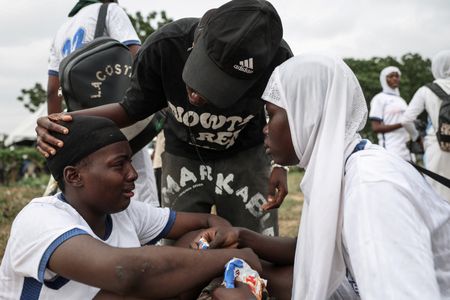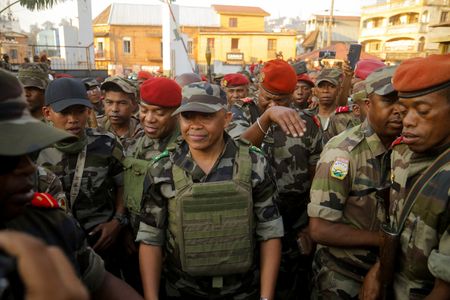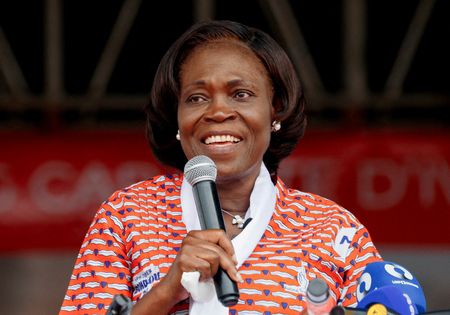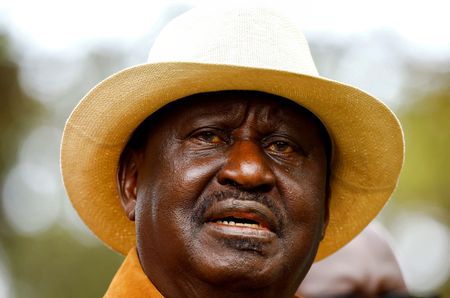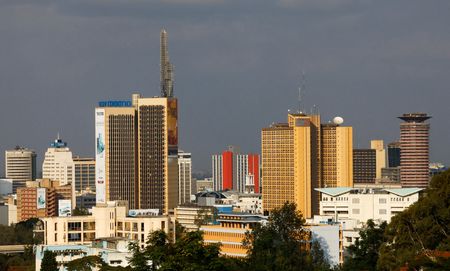ILORIN, Nigeria (Reuters) -In north central Nigeria’s Muslim-majority state of Kwara, where religious traditions shape daily life, a group of girls are challenging cultural norms by playing soccer.
They’ve embraced the game’s team spirit, competitive thrill, plus the highs and lows of winning and losing, all whilst trying to ignore the disapproval of those who consider it unsuitable for women who choose to dress modestly.
As Maryam Muhammed laces up her boots and heads to soccer training at a local school in Ilorin, she feels the sweltering heat – made worse by her hijab and leggings – as well as the scorn from some in the local community.
Muhammed, 17, regularly hears taunts as she walks to her
training sessions with the Model Queens Football Academy.
“They tell me I won’t achieve anything. But I believe I will achieve something big,” she said.
Despite the discomfort, it is important to her to cover up when she plays rather than wear shorts and a t-shirt.
“Sometimes it feels like I want to open the hijab, but I must not expose my hair,” she said. “I have to put it on as a good Muslim.”
Hijabs, which cover the head and neck, were barred by soccer’s world governing body FIFA on safety grounds in 2007, a move which led to the Iranian women’s team being banned from a qualifying match for the 2012 Olympics. The ban was relaxed in 2012, and the hijab fully permitted in 2014.
Nouhaila Benzina of Morocco became the first player to wear a hijab at a senior women’s World Cup in 2023.
MOTHER CRITICISED FOR ALLOWING DAUGHTER TO PLAY
Muhammed’s mother, Kehinde Muhammed, has faced criticism for allowing her daughter to play. “So many people discouraged me,” she said. “But I respect my children’s decisions. I support her and keep praying for her.”
She sews hijabs to match team jerseys. “I counsel her that this is the normal way you’re supposed to be dressed as a Muslim,” she said.
Model Queens coach Muyhideen Abdulwahab is trying to change
perceptions. “We go out to meet parents, to tell them there are
laws in place for modest dressing,” he said. “Despite that, some still say no.”
Team member Bashirat Omotosho, 19, is passionate about the sport but cannot always attend training because she has to help her mother sell puff puff, a fried dough snack, at a roadside stall in order for the family to make enough money.
Sometimes the team jog past the stall as part of their training, which is frustrating for her.
“Training is often in the morning, but I have to be here,” she said, handing snacks to customers. “I can’t leave my mum –
this is how I earn money.”
Her mother, Titilayo Omotosho, was initially hostile to the
teenager’s sporting ambition.
“Why would a lady choose football?” she asked.
But after her husband gave his blessing, the mother relented. “Seeing other Muslim girls succeed, like Asisat,
encouraged us to let her play,” she said, referring to Nigeria
star Asisat Oshoala, the record six-time African Women’s
Footballer of the Year. Oshoala, who does not wear a hijab on the pitch, comes from Lagos, in southwest Nigeria, where Islam is less conservative.
WOMEN’S GAME GAINS POPULARITY
Despite growing interest, female participation in soccer remains low in Ilorin, said Ambali Abdulrazak, a local football
administrator.
The Nigeria Women’s Football League (NWFL) is among Africa’s
strongest, led by southern clubs from cities like Lagos and Port Harcourt, where infrastructure and societal support are robust.
In contrast, northern and central regions face cultural and religious barriers, though grassroots efforts are expanding.
Nationwide, the sport’s popularity is rising, driven by the
success of the national women’s team, the Super Falcons, as well
as increased sponsorships and grassroots programmes.
NWFL viewership has grown by 40% since 2020, with match attendance up 35% in 2024, according to Nigerian media company
iTelemedia, which tracks audience trends across local leagues.
As the sun dipped, Muhammed and her teammates jogged across
a sandy pitch at the local school during one of their training
sessions, their voices rising between bursts of a muezzin’s call
to prayer from a nearby mosque.
On August 29, Muhammed captained the Model Queens in a youth
tournament final. They lost. At the whistle, she high-fived
teammates and cheered as they received runners-up medals. Later,
alone in her room, she broke down in tears over the defeat.
But the support of her family and her faith have kept her
going. “I really love this sport. I have passion for it,” she
said. “Since my parents support me, there is nothing stopping
me. Football is my dream.”
(Reporting by Benjamin Ezeamalu; Editing by Estelle Shirbon and Alexandra Hudson)

